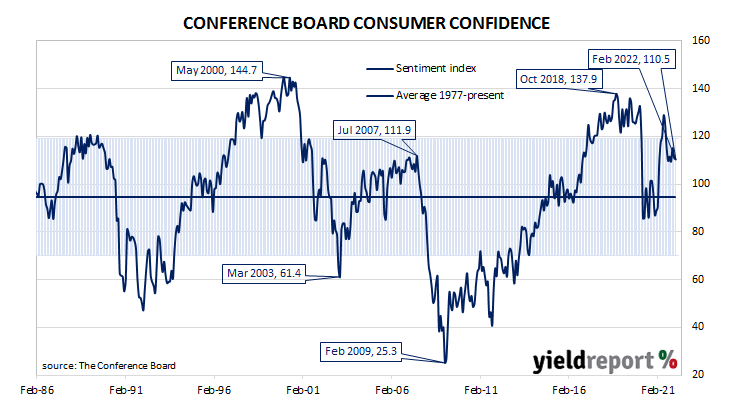Summary: Conference Board Consumer Confidence Index deteriorates slightly in February; reading slightly essentially in line with consensus expectations; view of present conditions improve, short-term outlook deteriorate; inflation concerns pick up but relatively confident about short-term growth; households neutral regarding economic conditions.
After the GFC in 2008/09, US consumer confidence clawed its way back to neutral over a number of years and then went from strength to strength until late 2018. Measures of consumer confidence then oscillated within a fairly narrow band at historically high levels until they plunged in early 2020. Subsequent readings then fluctuated around the long-term average until March 2021 when they reached elevated levels.
The latest Conference Board survey held during the first two weeks of February indicated US consumer confidence has deteriorated slightly. February’s Consumer Confidence Index registered 110.5 on a preliminary basis, a reading which was essentially in line with the median consensus figure of 110.0 but slightly below January’s final figure of 111.1.
Consumers’ views of present conditions improved a little while their outlook for the near-future deteriorated slightly. The Present Situation Index crept up from a revised figure of 144.5 to 145.1 while the Expectations Index declined from a revised figure of 88.8 to 87.5.
Lynn Franco, a senior director at The Conference Board said inflation concerns picked up among households but “consumers remain relatively confident about short-term growth prospects.”
US Treasury bond yields jumped at the short end but remained almost unchanged elsewhere along the curve on the day. By the close of business, the 2-year Treasury bond yield had gained 7bps to 1.54%, the 10-year yield had returned to its starting point at 1.93% while the 30-year yield finished 1bp lower at 2.23%.
In terms of US Fed policy, expectations for a higher federal funds rate over the next 12 months hardened noticeably. At the close of business, March contracts implied an effective federal funds rate of 0.265%, 19bps higher than the current spot rate. June contracts implied a rate of 0.90% while March 2023 futures contracts implied an effective federal funds rate of 1.825%, 175bps above the spot rate.
Franco also said households remained fairly neutral regarding economic conditions. However, he expects household confidence and spending “will continue to face headwinds from rising prices in the coming months.”
The Consumer Confidence Survey is one of two monthly US consumer sentiment surveys which result in the construction of an index. The Conference Board’s index is based on perceptions of current business and employment conditions, as well as respondents’ expectations of conditions six months in the future. The other survey, conducted by the University of Michigan, is similar and it is used to produce an Index of Consumer Sentiment. That survey differs in that it also includes some longer-term questions.


